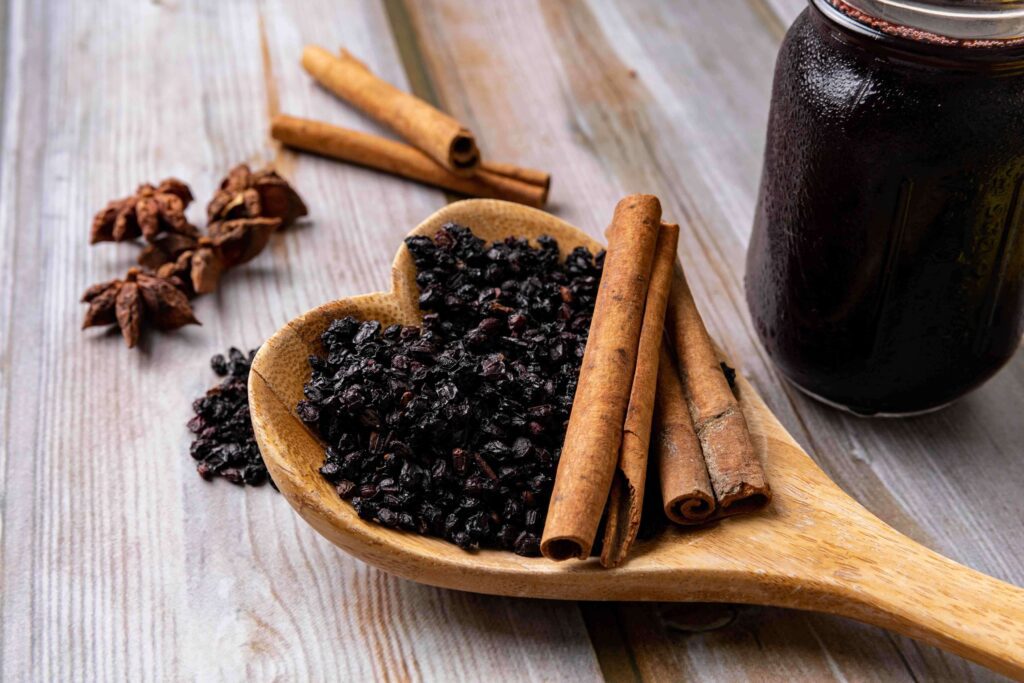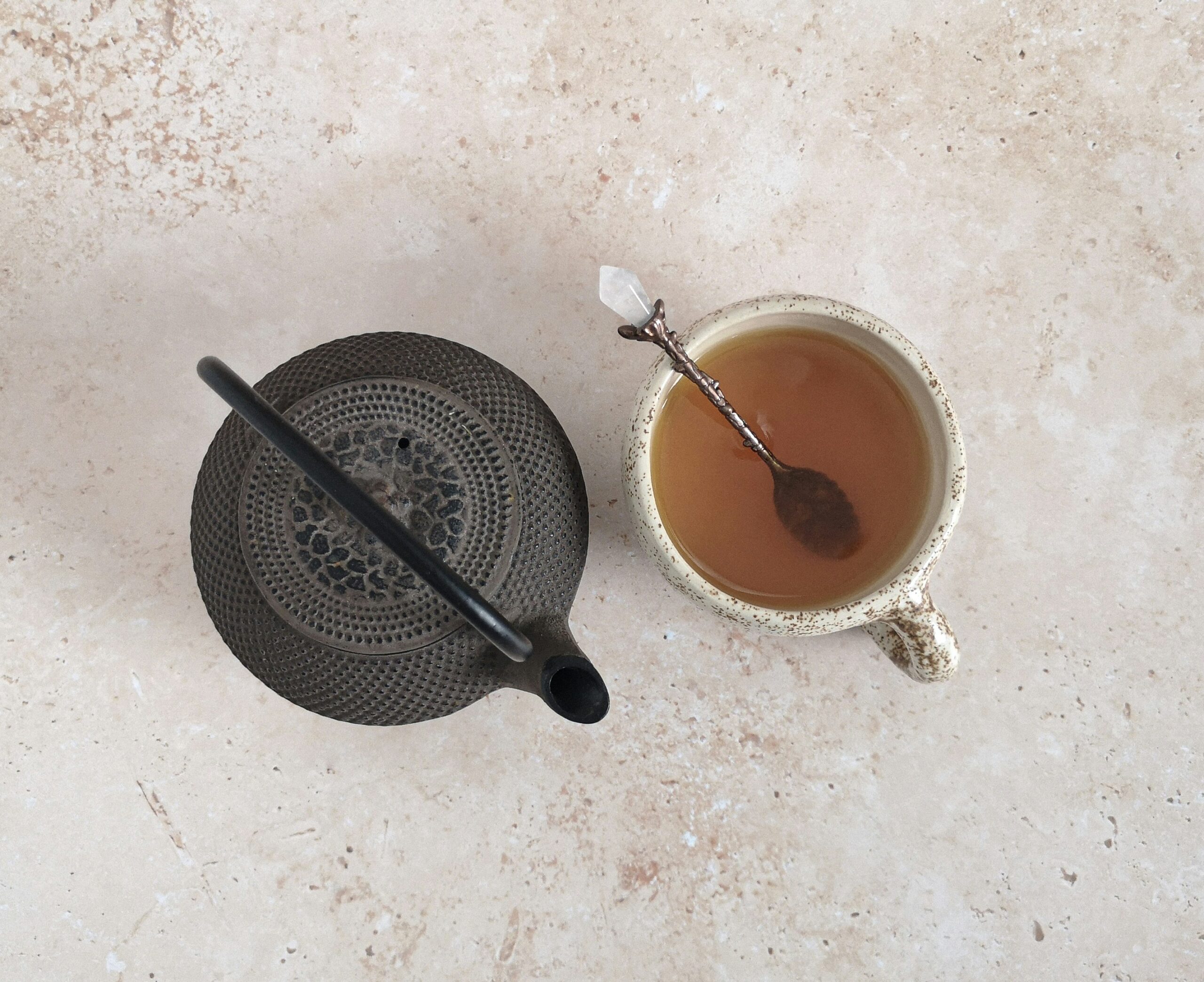
Elderberry tea, traditionally made from the dried berries of the Sambucus nigra plant, has been a staple in herbal medicine for ages.
Valued for its rich nutritional profile, this tea contains natural compounds that may offer health benefits, ranging from immune support to anti-inflammatory properties. Its increasing popularity isn’t just due to its potential health perks but also for its pleasantly tart flavour, making it a delightful addition to any daily routine.
As you explore the world of herbal teas, elderberry tea stands out with its deep purple hue, hinting at its high antioxidant content. To gain the most from your cup of tea, understanding its preparation is key. While it’s simple to make, the right techniques can enhance both its efficacy and taste. Meanwhile, being aware of safety considerations is essential, as the raw berries and other parts of the elder plant can be toxic if not properly processed.
Key Takeaways
- Elderberry tea may support your health due to its antioxidant properties.
- Proper preparation is crucial to maximise the tea’s benefits and flavor.
- Be mindful of safety guidelines to enjoy elderberry tea responsibly.
What are we talking about today …
- What are the benefits of elderberry tea?
- How to prepare elderberry tea?
- How to optimise elderberry tea flavour?
- Safety and considerations
- Frequently asked questions

What are the benefits of elderberry tea?
So what is elderberry tea good for?
Elderberry tea harnesses the numerous benefits of elderberries, especially when it comes to potentially providing immune support, offering cold and flu relief, and potentially preventing chronic diseases. Here’s a closer look at how sipping this beverage can be beneficial for your health.

Immune Support
Elderberries are power-packed with vitamins and antioxidants that can assist in bolstering your immune system. Including elderberry tea in your routine may give your body a better chance at fending off pathogens.
- Antioxidants: Elderberries are rich in compounds like flavonoids and anthocyanins, known to have strong antioxidant properties.
- Vitamin C: One cup of elderberries contains a substantial amount of Vitamin C, which is crucial for immune function.
Cold and Flu Relief
Drinking elderberry tea might be your ally during the cold and flu season. The vitamin C and anti-inflammatory effects of elderberries can help in reducing symptoms and duration of these ailments.
- Duration: Studies suggest that elderberry extract has been effective in relieving symptoms of the flu.
- Symptoms: Compounds in elderberry can help alleviate nasal congestion and soothe the throat.
Chronic Disease Prevention
Regular consumption of elderberry tea might contribute to heart health and reduce the risk of chronic diseases, thanks to its high levels of antioxidants.
- Heart health: Antioxidants in elderberries may help in maintaining a healthy heart by reducing blood pressure and cholesterol levels.
- Anti-inflammatory: The anti-inflammatory effects of elderberry can be beneficial in combating chronic inflammation, which is a root cause of many chronic diseases.
How to prepare elderberry herbal tea
Enjoying a cup of elderberry tea can be a delightful experience, especially when you brew it yourself. You’ll need some simple ingredients and a basic understanding of brewing techniques to create this comforting beverage.
Basic Ingredients
To make elderberry tea, gather the following:
- Water: You’ll need about 100 mL for a single serving.
- Dried Elderberries: Approximately 1.5 g or 1 teaspoon of dried elderberries is enough.
- Raw Honey: Sweeten your tea to taste, usually a teaspoon will do.
- Lemon: A few slices for a refreshing zest.
- Additional flavors (optional):
- Cinnamon Stick: Adds a warm and spicy note.
- Ginger: A small slice for a bit of kick.
Brewing Techniques
- Preparation:
- Begin by placing a small saucepan on the stove.
- Pour the water into the saucepan, and bring it to a simmer.
- Infusion:
- Add the dried elderberries to the simmering water.
- If desired, include a cinnamon stick, ginger, and lemon slices for extra flavor.
- Let the mixture infuse for about 15 minutes.
- Finishing Touches:
- Strain the tea into your favorite cup.
- Stir in raw honey while the tea is warm to ensure it dissolves properly.
This elderberry tea recipe is a simple way to indulge in a naturally flavored drink that you can enjoy at any time of the day.
RELATED: The So-Called Healing Power Of Herbal Tea – An Introduction
How to optimise elderberry tea flavour? 2 Simple Ways
Creating the perfect cup of Elderberry tea is all about balancing the sweet and tart flavours to cater to your taste buds. Whether you prefer a natural sweetness or a spicy kick, you have various options to personalize your tea experience.

1) Sweetening Options
When it comes to sweetening your Elderberry tea, sugar is a traditional choice, but there are healthier alternatives to consider. Honey not only offers sweetness but also complements the tea with its floral notes. Here are some sweeteners you might use:
- Sugar: The classic sweetener, providing a straightforward sweetness.
- Honey: Adds a rich, floral sweetness and can soothe your throat.
- Stevia: A no-calorie natural sweetener, ideal for a guilt-free sweetness.
- Maple Syrup: Provides a unique, rich taste different from traditional sweeteners.
Remember, the amount of sweetener you add can be adjusted to satisfy your preference for a sweeter or more tart flavor.
2) Spice Variations
Spices are a fantastic way to enhance the natural flavor profile of Elderberry tea, bringing warmth and complexity. Here are some spices you might consider:
- Cinnamon: A sprinkle of cinnamon can add a warm and comforting note.
- Ginger: Fresh or powdered, it contributes a peppery kick that can invigorate your senses.
- Turmeric: Known for its health benefits and earthy taste, it pairs well with the tartness of Elderberry.
- Mint: For a refreshing twist, mint leaves offer a cool and crisp finish.
Experiment with these spices to find the perfect blend that suits your taste.
Safety Considerations
When enjoying Elderberry tea, your well-being is paramount. It’s important to prepare it correctly and understand any potential risks that come with consuming this herbal beverage.
Proper Preparation
To ensure safety, Elderberry tea should always be made from cooked elderberries. Raw elderberries may contain compounds that can be toxic if ingested. Typically, when elderberries are cooked, these harmful substances are neutralized. This is also true for the elderflower, which should be properly dried or cooked before use.
Potential Risks
Consuming Elderberry tea is generally considered safe for most people when used in moderation. However, it’s vital to be aware of potential side effects such as nausea, vomiting, or diarrhea. If you experience any of these symptoms, it would be wise to discontinue use and consult a healthcare provider.
For those who are pregnant or breastfeeding, there’s insufficient evidence to confirm safety, so it’s best to err on the side of caution and avoid elderberry products unless approved by a health professional.
Furthermore, elderberry may affect your blood sugar levels. If you have concerns about diabetes or any other health condition affected by blood sugar, discuss the use of Elderberry tea with your doctor to prevent complications.
Frequently Asked Questions
Elderberry tea is appreciated for its flavour and potential health benefits, but you might have questions about its preparation, benefits, and precautions. Let’s explore some common inquiries.
What are the potential benefits of drinking elderberry tea?
Elderberry tea is often consumed for its antioxidant properties. Some also believe it can help with the prevention and treatment of viral respiratory illnesses.
How can one create homemade elderberry tea using fresh elderberries?
To make elderberry tea at home, you’ll need fresh elderberries. Simmer them in water and strain the mixture to enjoy a homemade batch of this nutritious beverage.
Are there any known side effects associated with drinking elderberry tea?
While elderberry tea is safe for most people, consuming large quantities may lead to mild side effects such as stomach upset or allergic reactions in some individuals.
Could elderberry tea potentially induce sleepiness?
There’s no strong evidence to suggest elderberry tea directly causes sleepiness. However, the relaxation associated with drinking warm beverages might contribute to a feeling of drowsiness.
What are some considerations for individuals who should avoid elderberry tea?
Pregnant and breastfeeding women, as well as individuals with autoimmune disorders, should exercise caution or avoid consumption due to lack of research in these specific populations.
Where can one purchase elderberry tea?
Elderberry tea can be bought from health food stores, some supermarkets, and online retailers. Be sure to select a product from a reputable brand or source to ensure quality and safety.



Comments +